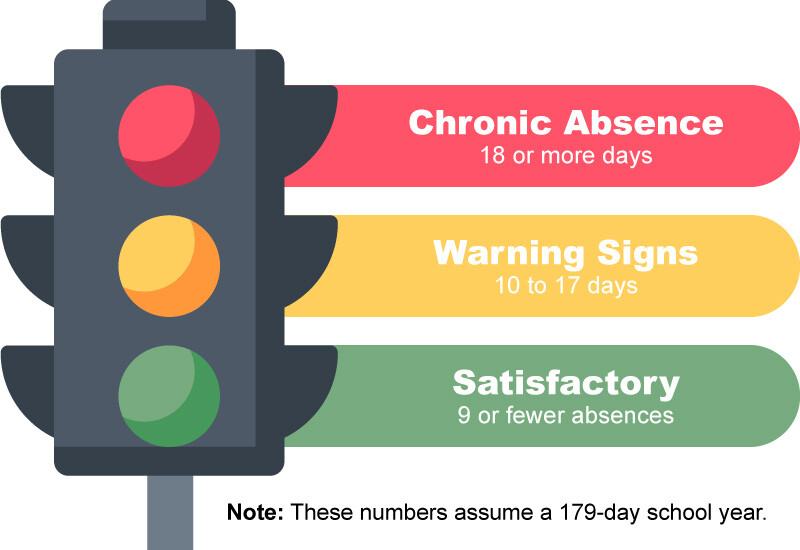Every Day Counts!
Attendance is a major factor in allowing children and teens to succeed in school. Research shows that students in any grade, including Kindergarten, have difficulty catching up if they miss too much school. Absenteeism is also a very strong predictor of dropout rates, more so than suspensions, test scores, or retention.
Our schools want to work with you, our parents and guardians to ensure student success. By making attending school a priority, your child will have a better chance of succeeding and feeling good about their progress in school.
Regular attendance is a habit that translates into life beyond high school graduation. It prepares your child for the world of work. Explore more below.
When do Absences Start to Negatively Impact My Child's Success?

Partners in Attendance
- Parents/Guardians play an important role in the education of their children. Their involvement and encouragement can help a child/teen succeed in school.
- Other family members and friends can also play a key role in ensuring students understand why they must attend school to succeed.
- Success in school starts with regular attendance from the early years right through high school completion. Did you know that chronic absenteeism makes learning more difficult even as early as Kindergarten?
Our schools are committed to working with parents and guardians to find solutions to support your child/teen's learning success.
Alberta Education provides resources to support parent/guardian involvement. For more information, visit: My Child's Learning: A Parent Resource (learnalberta.ca)
Understanding Absences
Understanding the 'why' behind poor attendance habits can help families start to address their concerns. There are three categories:
Can Not
Sometimes students cannot attend school because of illness, injury, family problems, housing instability or involvement with the justice system.
Will Not
Sometimes, students will not attend school to avoid bullying, unsafe conditions, harassment, embarrassment related to learning difficulties, physical challenges, a new environment or even sanctions for being late.
Do Not
Sometimes students do not attend school because they may not know the importance of attending it.
What can families do?
- Make attendance a priority for your family
- Be sure your child gets enough sleep
- Have a regular homework schedule
- Communicate with your child's teacher(s) and school
- Encourage your child to participate in school clubs and after-school activities
If your child can’t, won’t or doesn’t attend, please make the attendance connection with your child’s school. Call the school office during regular school hours to get started.
Attendance Facts

Parents/Guardians and schools can work together to find solutions supporting children/teen's learning success.

Success in school starts with regular attendance from the early years right through high school completion. Did you know that even as early as Kindergarten, chronic absenteeism makes it more difficult to learn?

For students to experience success, positive connections must be created and maintained between the school staff, the student and their family.

A student who has missed 10 percent (about 18 days) or more of the school year or in the previous year missed a month of school.

Children often find it difficult to catch up on missed work.

Parents underestimate their child’s absences by 50%.

Reducing chronic absence can help close achievement gaps.

Only 17% of kids who are chronically absent in Kindergarten and 1st grade are proficient in reading by the end of 3rd grade.

More Support
Talk to your school or visit www.attendanceworks.org for more attendance strategies and resources.

